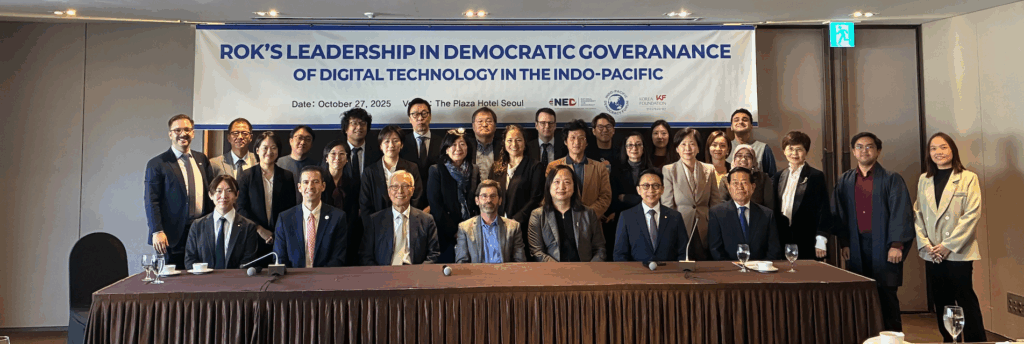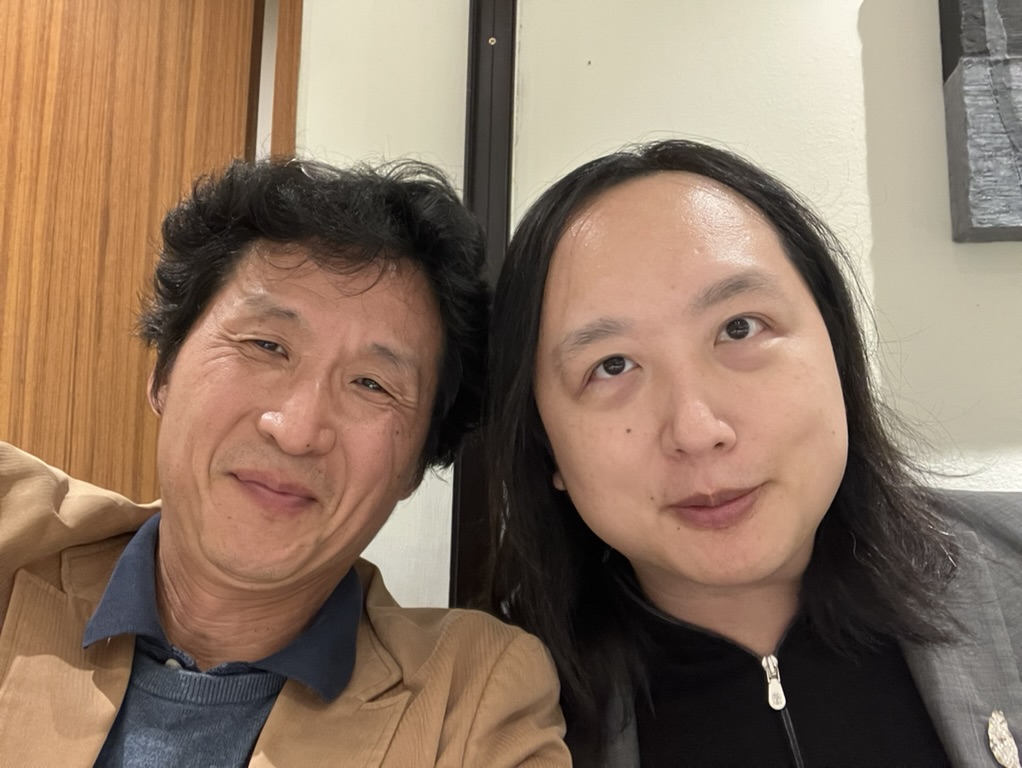Open Net spoke at a NED-convened gathering of the lawmakers, officials, and experts of Taiwan, Japan, and Korea (see below for the agenda) on October 27, 2025.

K.S. Park focused on the nature of current iterations of AI being a stochastic machine operating on data sets and that data governance has to be the key to AI governance as follows:
The reason people are concerned about AI and democracy is that people are accepting AI’s summaries without surfing the web and reading the websites themselves. AI’s output such as deepfakes are being accepted without actually checking the realities. Just last week, it was revealed that a local Korean police used a Korean legal AI in dismissing a complaint on a Children Welfare Act violation and cited a case that does not exist. This is important because people are spending increasingly more time on AI than on internet.
But this is not the first time we are facing a technology and democracy question. We have faced that question in relation to the internet and we should use that experience as the lens to look at AI. Internet is a proven machine for democracy in a sense that it gives every powerless individual the power of mass communication previously reserved to elites that dominated the space and airtime and AI has a potential to be a proven machine for democracy in a sense that it gives every powerless individual the power of knowledge previously reserved to elites. So as we looking at AI as a threat, we should start looking at AI also as an opportunity.
However, one knee-jerk reaction to the fear of AI happened here when Korea passed an election law that banned use of AI in elections allowing no exception for parody and satire, what is more, with no requirement that it amounts any statement of falsity. The only requirement is that material is “difficult to distinguish from the reality”. What? Haven’t we all celebrated such fine art movements as impressionism and hyper-realism for capturing the changing movement of light and the details of the reality in a manner that is “difficult to distinguish from the reality”? I am quoting the phrase emphatically so the Americans in the audience go back to their country and find similar legislative bills punctuated with such phrases. In the end, movement builders need be able to use impactful visuals and virtual models, which were previously monopolized by big companies that could hire an army of human artists and real models.
Then, what is a good example of AI regulation? Now, intelligence is an evolutionary concept. AI is not intelligent in any sense that an animal or a person is intelligent. AI is only a machine that analyzes and synthesizes a huge number of data sets and regurgitates an answer that is the most statistically probable answer to a human question or prompt, or the most statistically probable ending to a human overture.
So, for AI to work for you, your behavior data must be in the training data. For democracy, meaning for making AI to work for everyone, everyone’s data must be in the training data. Amazon’s hiring data probably lacked enough data on successful female executives. Diversity of the training data set is a key to AI.
At the same time, there has to be certain quality control. Chatbot Tay of Microsoft became racist and sexist because it was trained on the pre-existing data sets in Twitter and learned that being controversial is a key to getting more followers. If there is a feature of human behavior that we as a collective do not want to see, we should decidedly remove from the training data. This is so because the current version of AI is based on machine learning. It learns by trial and error as a child learns. A child can never define a cat or a dog. But after a child is shown many many photos of cat and many many photos of dog, a child knows a cat’s photo and a dog’s photo when it sees one. (By the way, there is a fundamental limit on explainability and transparency, including algorithmic transparency.) If you accept the metaphor to a child’s learning, what would you put in the textbooks used for training the child? Would you not curate carefully what is in the textbooks?
Now, let’s be careful. The government should not be involved in sanitizing the training data. We don’t want to see the likes of a Chinese government making AI buffer when asked about Tianamen Square. The civic groups and AI developers should work together to sanitize and curate the training data. Maybe, we need a regulation that forces such sanitization process without specifying what needs be removed. Any such regulation should have a full prohibition on data moderation by the government. Current AI laws of EU and Korea AI law really only require risk assessment but without saying how to do it, and furthermore, regulates only AI’s application, not AI itself.

During Q&A, when Audrey Tang asked whether mandatory data portability law can be a good AI regulation: Certainly, so i proposed two regulatory goals above along the grain of the current machine-learning based nature of AI: (1) training data diversity; (2) training data quality control but the third one I didn’t mention is (3) even distribution of training data so that more players can train AI in the pluralistic ways that they see fit. I actually think that we can go even further by mandating platform interoperability so that we can reduce the network effects and address data monopoly at its source.
Audrey Tang and KS Park continued the discussion afterwards to agree that the training data curation/sanitization can be done and important for AI quality control but should not be done by the governments, and more importantly that there has to be what KS Park calls “singularity control” meaning the restriction on the conditions in which AI is given a global self-preservation command and the independent physical body to carry out the command.


0 Comments